The drama series #jubilee based on Bombay Talkies has an interesting connection to Savarkar and Sri Aurobindo (if you stretch it, to Gandhi and Modi)
Besides Himansu Rai and Devika Rani, there is a less known but bizarre story of a third founder of the studio, Niranjan Pal.
🧵
Besides Himansu Rai and Devika Rani, there is a less known but bizarre story of a third founder of the studio, Niranjan Pal.
🧵
https://twitter.com/Paperclip_In/status/1648895321781719041
When Devika Rani was sent to England, she lived at the home of a family friend Niranjan Pal and his wife Lily Bell, a rare multi-racial couple in the 1920s, at their home in Paddington.
Pal was a playwright who had kickstarted Rai's career - Rai initially planned to become a lawyer, but in 1922 was introduced to Pal, and became part of his production of "Goddess" on London's theatre distrct
Rai and Pal would become close friends and collaborators for several years, Pal was eventually the key player in the incident of Devika Rani taking off with Najmul Hassan to join another company.
In real life, that move was to be to Calcutta, not Karachi as shown in the film, and took place a decade before.
As in the show, Rai himself went and confronted his wife and brought her back. This was done while Hassan was out on an acting job.
As in the show, Rai himself went and confronted his wife and brought her back. This was done while Hassan was out on an acting job.
Pal was called upon to first convince Ashok Kumar to leave the technical department and move to acting, and then to quell a brewing rebellion surrounding the return of Devika Rani, who a lot of studio staff did not want back after the Najmul Hassan event.
But the actual story of Niranjan Pal is a lot stranger, and it goes back to 1908 and the Alipore Bomb plot, one of the landmark cases that took place during the colonial period.
Pal's father was a close associate of Aurobindo Ghosh, the two edited 'Bande Mataram' together, and when the Bande Mataram Sedition case led to Pal's father being jailed on account of refusing to testify against Aurobindo Ghosh.
incarnateword.in/documents/band…
incarnateword.in/documents/band…
With his father in jail, and with close ties to "Auroda", Niranjan is quickly involved with a number of revolutionaries in Kolkata with the Muraripukur crew, a hotbed of nationalist activity at the time.
en.wikipedia.org/wiki/Anushilan…
en.wikipedia.org/wiki/Anushilan…
In early 1908, Niranjan Pal stole a pistol after a fistfight with a Scotish tea planter, which was to be used in the plot. Niranjan handed the gun over to Ullaskar Datt, one of the key plotters, who was incidentally in love with Pal's older sister Leela.
When the gun was stolen, the Bengali Chamber of Commerce passed a resolution, asking for police action against the theif of the gun who was still unknown and absconding. Ullaskar Datt would be arrested in possession of bombs and the gun.
Datt was sentenced to death, along with Barin Ghosh, brother of Aurobindo, but the love story with Leela was not over. More on that later.
en.wikipedia.org/wiki/Emperor_v…
en.wikipedia.org/wiki/Emperor_v…
Desperate to achieve martyrdom, a big deal among educated Bengali nationalists at the time, Pal wrote anonymously to the commissioner of police, implicating himself!
A policeman with nationalist sympathies informed Pal's father of the letter, warning that a warrant was coming.
A policeman with nationalist sympathies informed Pal's father of the letter, warning that a warrant was coming.
Once his father knew an arrest was imminent, he arranged immediately to have him leave the India to go to.... London. As it turns out sedition was not prosecuted in Britain, a host of Indian revolutionaries operated out of London.
The headquarters for revolutionaries in London was "India House", established by Shyamji Krishna Varma.
Now Pal is told by his father, strictly, to avoid trouble with the gun situation still looming.
en.wikipedia.org/wiki/India_Hou…
Now Pal is told by his father, strictly, to avoid trouble with the gun situation still looming.
en.wikipedia.org/wiki/India_Hou…
But when he lands in London, and his primary local contact is... Vinayak Savarkar. Savarkar becomes a mentor of sorts, showing Pal around London, killing time listening to speeches at Hyde Park, teaching him the ropes of living in British society.
Besides Savarkar, the three others in their group are Asaf Ali, Lala Hardayal, and Virendranath Chattopadhyaya - each revolutionaries in their own right.
Savarkar is described by Pal as carefully dressed and culturally aware. Savarkar was the de-facto leader of India House.
Now among Pal's first tasks was to send cyclostyled copies of bomb-making instructions to be mailed to India, which he did.
His father found out.
Now among Pal's first tasks was to send cyclostyled copies of bomb-making instructions to be mailed to India, which he did.
His father found out.
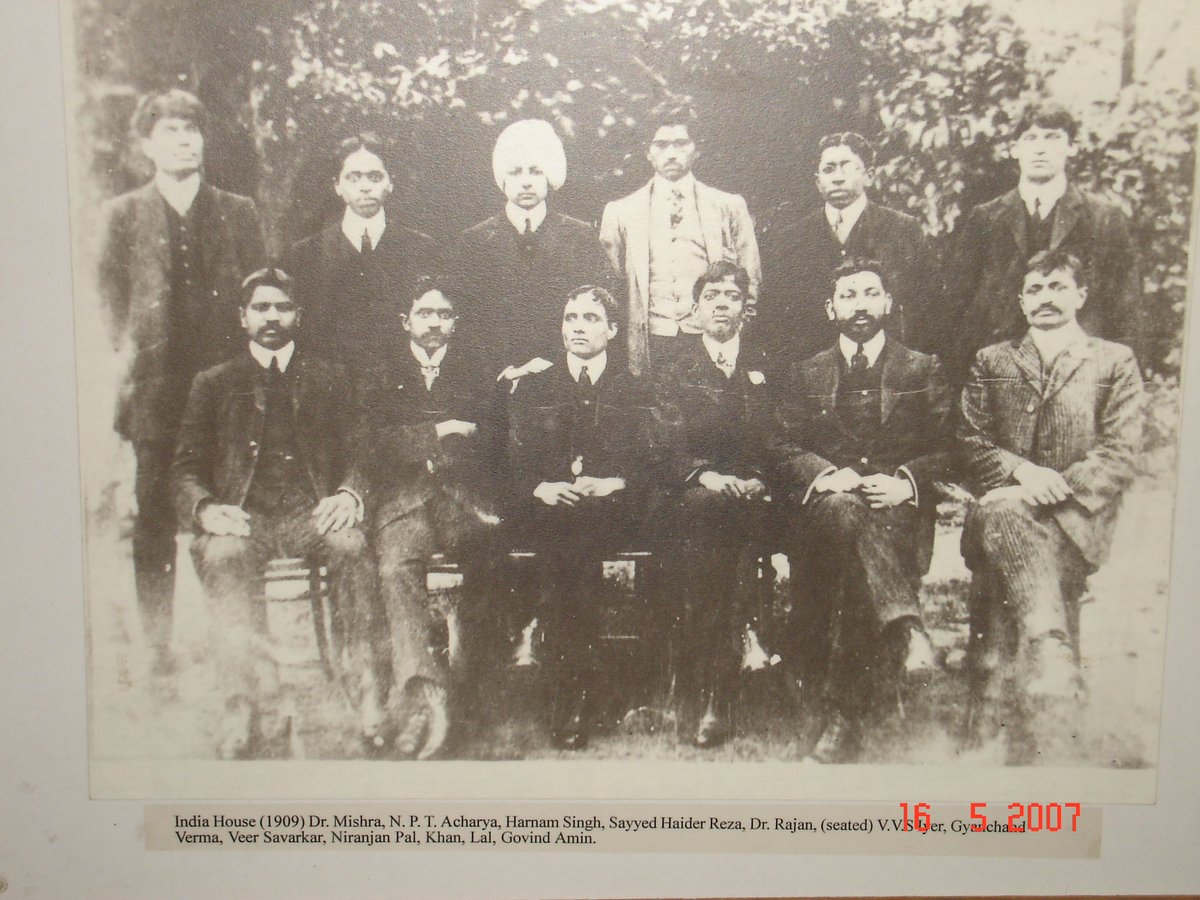
Savarkar and Pal end up in a strong friendship, with memoirs from both that recount several incidents they were involved in together socially and politicially.
At this point, Savarkar was actively planning an assassination that woudl grip the news.
At this point, Savarkar was actively planning an assassination that woudl grip the news.
After consulting with Savarkar, Pal decides to apply to Scotland Yard to become a policeman so he can infiltrate the organization.
Again, Pal's father finds out, and demands that he leave Savarkar's company, Niranjan declines.
Then, fate intervenes.
Again, Pal's father finds out, and demands that he leave Savarkar's company, Niranjan declines.
Then, fate intervenes.
A conflict between Savarkar and Shyamji Krishna Varma, the then key expat funder of nationalistic activities, leads to Savarkar moving out of India House.
Savarkar moves in with .... Niranjan Pal, at a home arranged by Pal's father, on Sinclair Road in Kensington.
Pal is also happy to be living here, because he has now fallen in love with Eva, an Irish secretary in the house.
Pal is also happy to be living here, because he has now fallen in love with Eva, an Irish secretary in the house.
He is also in some murky collaboration since her father are brothers are active in the IRA, which adds to Pal's desire to be thrown in with more anti-English revolutionary activities.
The turning point comes with the assassination, which would both change the nature of the Indian revolutionary presence in London, and ripple into Hindutva as we know it today.
Pal and Savarkar drop Dhingra to Notting Hill station, from where he is to go forth and commit the assassination. Savarkar tells Dhingra not to show his face again if he fails to carry out the assassination.
An excerpt from Dhingra's biography:
An excerpt from Dhingra's biography:

Dhingra carries out the assassination, but the letter is confiscated. Savarkar escapes to Paris, but later returns. A copy of the letter Dhingra is to read is found on Savarkar, who is then jailed, to be transported to the Andamans
While in custody, Savarkar tells Pal and Virendranath Chattopadhyaya (aka Chatto) to get a couple of thugs (who Savarkar met in jail) to break him out when he is being transported to court.
The plan fails, the thugs take the money and beat up the clueless duo.
The plan fails, the thugs take the money and beat up the clueless duo.
Now Chatto is a story unto himself.
A long time friend of Pal's from Bengal, Chatto was Sarojini Naidu's brother. He would leave England after the Savarkar episode and turn communist, becoming the architect of the Berlin Committee. He was executed by Stalin in the Great Purge.
A long time friend of Pal's from Bengal, Chatto was Sarojini Naidu's brother. He would leave England after the Savarkar episode and turn communist, becoming the architect of the Berlin Committee. He was executed by Stalin in the Great Purge.
Back to Plan B - to arrange an escape for Savarkar when the ship carrying him stopped in France. Pal and Chatto were to arrange for someone to be on land in Marseille after Savarkar jumped out of the ship and swam ashore, but they weren't the most competent planners.
Chatto made it to France, but had no money for the train to Marseille, and the story goes Shyamji refused to help.
So there was nobody to help Savarkar talk to French police, who handed him back to the British, then sealing his fate.
So there was nobody to help Savarkar talk to French police, who handed him back to the British, then sealing his fate.
So if you remember the Indian school textbook story about Savarkar's daring escape and its failure, well, it turns out Chatto and Pal were the ones who bungled it.
After Savarkar left, most of the former India House people had no leader, and the revolutionary movement fizzled.
Pal's father is arrested, and his only source of cash is a small stipend from Chittaranjan Das.
Pal's father is arrested, and his only source of cash is a small stipend from Chittaranjan Das.
Pal falls into poverty, working as a cook, an inventory clerk at Harrods, and as a postal clerk. He is routinely fired for taking offence to slights of various kinds. He's lovingly referred to as 'Darkie' by his friends. 
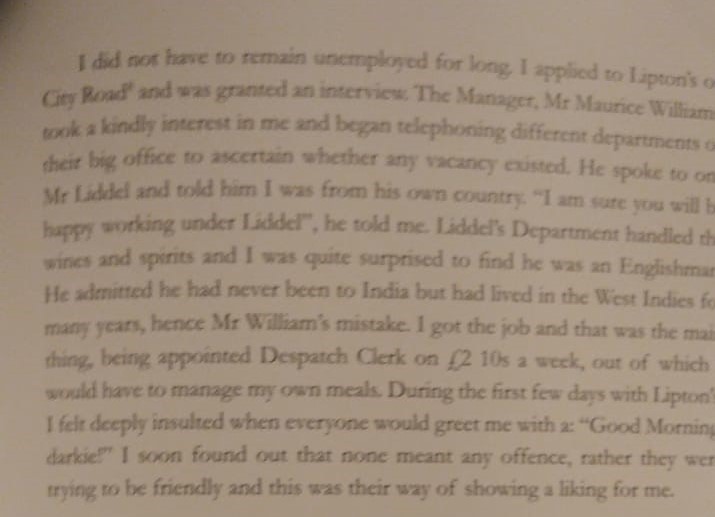
With no access to heating, he spends much of his time in libraries and Museums. This and working at the post office keeps him up with his writing, and he starts working on an adapation of the life of the Buddha for screen.
His trigger for starting a career writing was an altercation with an British man who wrote and produced a play which showed Indians in poor light, and told him to "go write his own" if he didn't like the depiction of Indians on stage.
So he did just that.
So he did just that.
He gets a job with the Charles Urban company, an important early film company, and starts working on the script of "Light of Asia".
The film is almost produced several times, but keeps getting delayed on account of World War 1.
The film is almost produced several times, but keeps getting delayed on account of World War 1.
There are a bunch of side adventures between Pal and others, including George Bernard Shaw, Chittaranjan Das and MK Gandhi himself, with whom Pal served (and clashed) on the WW1 volunteer corps.
During the war, he also fell in love with, and married a British woman Lily (at the time, most of the men were out at war), and they would later be the first Indians on Vivian Avenue in Wembley.
That may be history itself.
That may be history itself.
By the early 1920s, he was a very successful playwright, the first "native" Indian whose work was performed at London's West End.
It was here Himansu Rai was introduced to him, and Pal cast him in his plays.
It was here Himansu Rai was introduced to him, and Pal cast him in his plays.
Pal held brand recognition as one of the early members of the Indian Art and Dramatic Society, the first group of native Indians who would produce theatre for British audiences.
Before them, plays about India were written, directed, and produced by White British writers.
Before them, plays about India were written, directed, and produced by White British writers.
The first play that he wrote on White British working-class society "the Magic Crystal" was got a standing ovation on first night.
When the audience started screaming "writer, writer" to have him brought out to applaud him, they were shocked to find "N. Pal" was a coloured man.
When the audience started screaming "writer, writer" to have him brought out to applaud him, they were shocked to find "N. Pal" was a coloured man.
The next day, the play was was savaged stating a 'native' had the impertinence to write an English farce.
Magic Crystal ended his theatre career.
Magic Crystal ended his theatre career.
While Pal's career in theatre was broken by Magic Crystal, he decided instead to switch to cinema, pairing with Rai as his main collaborator.
Rai begam the "Indian Players" a troupe of Indian theatre artistes, the two began touring England doing showings of their play. This eventually took them back and forth to Munich, where they got some seed funding from Emelka Konzern to produce "Light of Asia".
While Rai met Devika Rani through Pal, and eventually they would all work in Germany, Rai had in fact been seeing a German woman, who he married and had a child with.
Rai's German family is another story unto itself, here is an excerpt from his grandson Peter Dietze:
sbs.com.au/language/hindi…
sbs.com.au/language/hindi…
Light of Asia would be shot in India, and while the film was a commercial success in India, Emelka was waffling on releasing the film in Europe. As a desperate measure, Pal wrote to the King of England, requesting a command performance.
The crown accepted, now Rai and Pal ended up in Windsor Castle, showing the film to King George and Queen Mary.
There are funny stories of the two in the castle, but that's for another day.
There are funny stories of the two in the castle, but that's for another day.
Once British Royalty had seen the film, it was in the news, and it forced the hand of Emelka, who gave the film a wide release. This facilitated their next two ventures, Shiraz (about the making of the Taj Mahal) and Throw of Dice (about the Mahabharata).
The two also worked together in UFA film studios Weimar Germany, which was formative in Rai's decision to build Bombay Talkies, and in his structuring it as a corporate entity.
Pal and Rai kept a focus on making films about India that were driven by Indian artistes.
We read these as Orientalist today, but at the time, the work had a different meaning.
Most countries under colonial rule were rarely able to produce their work for Global audiences.
We read these as Orientalist today, but at the time, the work had a different meaning.
Most countries under colonial rule were rarely able to produce their work for Global audiences.
Pal also went on to write the first film with a Euopean script and settings that was written by an Indian - A Gentleman of Paris.
After the three silent films, Pal decided to return to India. One of his co-passengers on the ship was Chimanlal Setalvad, great grandfather of Teesta Setalvad (thus the Modi connection).
He became one of the earliest funders of the studio.
He became one of the earliest funders of the studio.
Soon after his return, Pal's father died, penniless with no home to call his own.
Pal then moved to set up the story and script department of Bombay Talkies, and his collaboration with Rai and Devika Rani was to create a string of successes.
Pal then moved to set up the story and script department of Bombay Talkies, and his collaboration with Rai and Devika Rani was to create a string of successes.
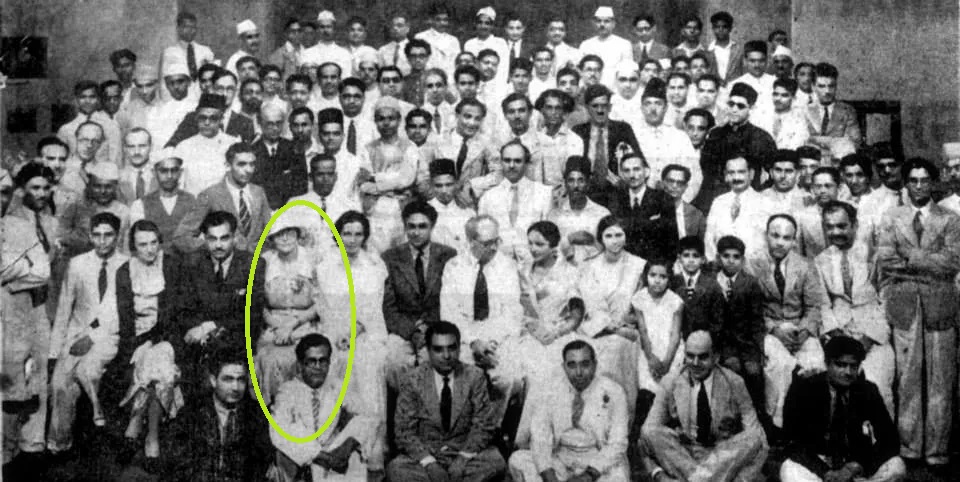
Devika Rani was a key player in both the artistic and business facets of the studio.
Several high-profile British men were completely smitten by her. At one point both a Governor, Lord Brabourne, and a governor's son Richard Bell (who she called Dickie Daddy) were wooing her
Several high-profile British men were completely smitten by her. At one point both a Governor, Lord Brabourne, and a governor's son Richard Bell (who she called Dickie Daddy) were wooing her
While Rai was comfortable with sharing power, the technicians and staff at Bombay Talkies took poorly to a female boss.
After the Najmul Hassan incident, there was little love lost between Devika and the staff.
After the Najmul Hassan incident, there was little love lost between Devika and the staff.
It was Pal who was brought in to convince a nervous (not scheming!) Ashok Kumar that a future lay in the artistry of being in front of the camera, rather than sticking to the technical work.
Here is an excerpt from Ashok Kumar's conversation with Pal.
Here is an excerpt from Ashok Kumar's conversation with Pal.

Pal quit Bombay Talkies on a temperamental whim, much like every job he quit.
He left Bombay immediately for Calcutta, weeks not concerned that his son was about to appear for his matriculation exams.
He left Bombay immediately for Calcutta, weeks not concerned that his son was about to appear for his matriculation exams.
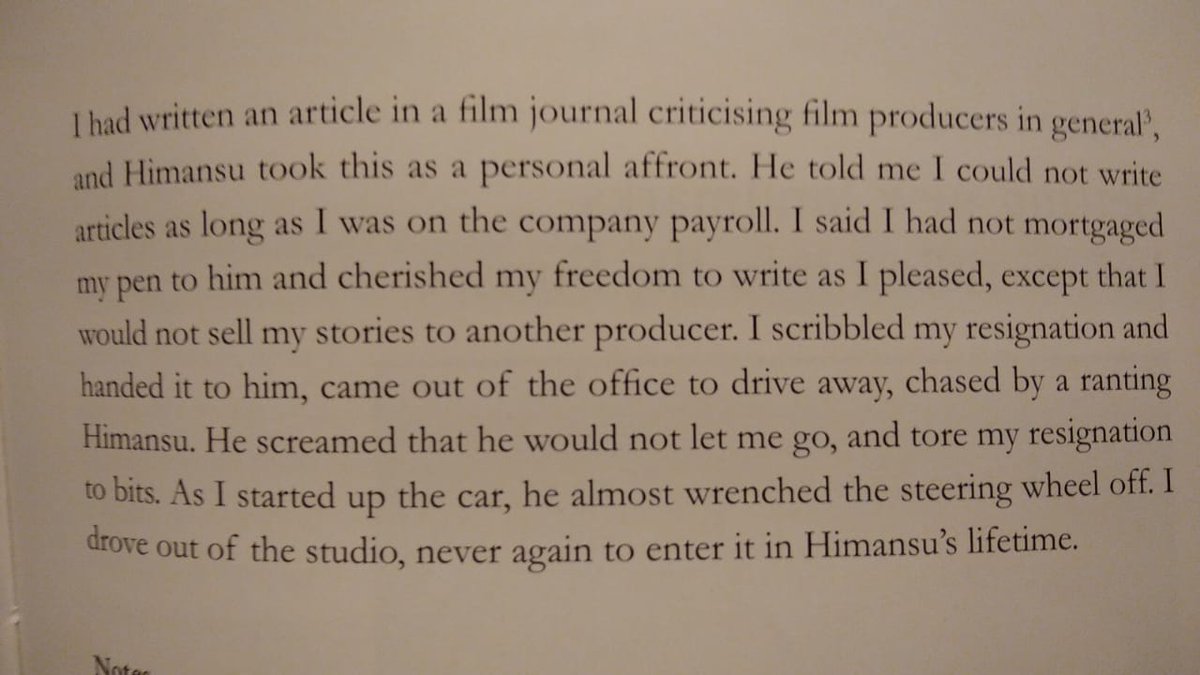
Now in Calcutta, his son would have to pass an exam in Bengali, which he could not read, and spoke sparingly. So he hires a tutor, Amiya Chakrabarty, to try and train him sufficiently for a matriculation, but this fails.
So Pal gets SP Mookerji who was by then Chancellor of Calcutta Univ to override the exam for his son. Mookerji is possibly second only to Savarkar in the early Hindutva canon.
This also shows how close knit elite circles of power were at the time.
This also shows how close knit elite circles of power were at the time.
Meanwhile, he has to do something with the Bengali tutor, so he arranges a job for him in.... Bombay Talkies, as a canteen assistant (remember the character from Jubilee?). Chakrabarty would later become a key filmmaker in Bombay Talkies.
en.wikipedia.org/wiki/Amiya_Cha…
en.wikipedia.org/wiki/Amiya_Cha…
Pal would continue his tempestuous career in Calcutta, Delhi, and Lahore, frequently penniless, but quitting jobs on slightest altercations, making his wife and son follow him around the country, often living as guests in random relatives homes since they could not afford rent.
Like his father, he would die penniless, never having owned a home or any property in his lifetime.
He did note in his memoirs though that he was happy to move to Malad which had a wine shop, even though the nearest chemist was at Khar.
He did note in his memoirs though that he was happy to move to Malad which had a wine shop, even though the nearest chemist was at Khar.
His death went largely unnoticed, outside of an obituary by.... Savarkar himself, who had a stinging critique for the lack of recognition for his work both as a revolutionary and as an artiste.
Here's a picture of Savarkar and Pal displayed at the Andaman Cellular jail.
Here's a picture of Savarkar and Pal displayed at the Andaman Cellular jail.
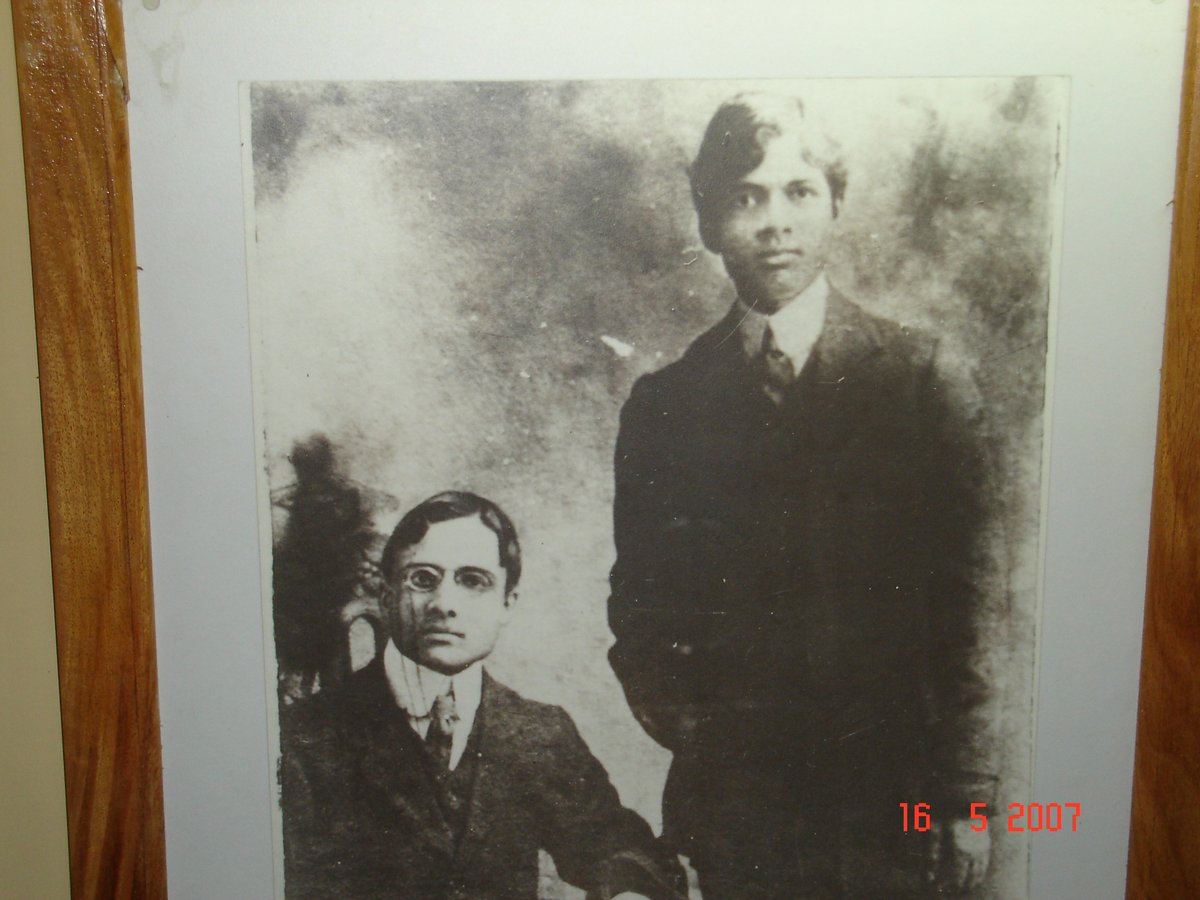
There is a footnote. Remember Ullaskar Datta who went to jail with the gun Pal stole, and in the process lost his love story with Leela, Pal's sister -- well he got out of jail in 1947, four decades after the initial love story.
At the time, Leela was widowed and disabled. Ullaskar himself traumatized after years in the Andamans married her and they spent their last years together.
• • •
Missing some Tweet in this thread? You can try to
force a refresh

 Read on Twitter
Read on Twitter








